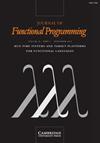Explicit effect subtyping
IF 1.1
3区 计算机科学
Q4 COMPUTER SCIENCE, SOFTWARE ENGINEERING
引用次数: 12
Abstract
Abstract As popularity of algebraic effects and handlers increases, so does a demand for their efficient execution. Eff, an ML-like language with native support for handlers, has a subtyping-based effect system on which an effect-aware optimising compiler could be built. Unfortunately, in our experience, implementing optimisations for Eff is overly error-prone because its core language is implicitly typed, making code transformations very fragile. To remedy this, we present an explicitly typed polymorphic core calculus for algebraic effect handlers with a subtyping-based type-and-effect system. It reifies appeals to subtyping in explicit casts with coercions that witness the subtyping proof, quickly exposing typing bugs in program transformations. Our typing-directed elaboration comes with a constraint-based inference algorithm that turns an implicitly typed Eff-like language into our calculus. Moreover, all coercions and effect information can be erased in a straightforward way, demonstrating that coercions have no computational content. Additionally, we present a monadic translation from our calculus into a pure language without algebraic effects or handlers, using the effect information to introduce monadic constructs only where necessary.显式效果子类型
随着代数效果和处理程序的日益普及,对其高效执行的要求也越来越高。Eff是一种具有本地处理程序支持的类似ml的语言,它有一个基于子类型的效果系统,可以在其上构建一个感知效果的优化编译器。不幸的是,根据我们的经验,为Eff实现优化是非常容易出错的,因为它的核心语言是隐式类型的,使得代码转换非常脆弱。为了弥补这一点,我们提出了一个显式类型多态核心演算的代数效果处理程序与基于子类型的类型和效果系统。它对显式强制转换中的子类型进行了具体化的呼吁,强制转换见证了子类型的证明,迅速暴露了程序转换中的类型错误。我们的面向类型的详细说明带有一个基于约束的推理算法,该算法将隐式类型化的effe语言转换为我们的演算。此外,所有的矫顽力和效应信息都可以直接擦除,这表明矫顽力没有计算内容。此外,我们提供了从微积分到纯语言的一元转换,没有代数效果或处理程序,仅在必要时使用效果信息引入一元结构。
本文章由计算机程序翻译,如有差异,请以英文原文为准。
求助全文
约1分钟内获得全文
求助全文
来源期刊

Journal of Functional Programming
工程技术-计算机:软件工程
CiteScore
1.70
自引率
0.00%
发文量
9
审稿时长
>12 weeks
期刊介绍:
Journal of Functional Programming is the only journal devoted solely to the design, implementation, and application of functional programming languages, spanning the range from mathematical theory to industrial practice. Topics covered include functional languages and extensions, implementation techniques, reasoning and proof, program transformation and synthesis, type systems, type theory, language-based security, memory management, parallelism and applications. The journal is of interest to computer scientists, software engineers, programming language researchers and mathematicians interested in the logical foundations of programming.
 求助内容:
求助内容: 应助结果提醒方式:
应助结果提醒方式:


